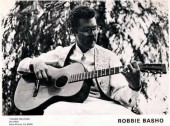Born in 1940 in Baltimore, Maryland, he became an orphan in his early childhood and got adopted by Dr Donald R.Robinson and his wife and grew up as Daniel R.Robinson jr.with a very typical middle-class childhood and youth. He spent his early years, up through high school, in Baltimore attending catholic schools run by nuns. At the high school level, he went to a military school and then on to the University of Maryland, where he was a premed student. He was athletic -playing lacrosse, doing weight lifting and other sports; he sang in school choirs and played the trumpet. After his junior year at the Univercity of Maryland he bought his century-aged mexican 12string from a sailor for 200 and discovered every possible music, classical music, bluegrass, oriental, improvisations on Bing Crosby. He became a beatnik, became interested in Japanese literature, began to write his own poetry, dabbled in painting and guitar. After discovering the most famous Japanese haiku poet Matsuo Basho he changed his name into Robbie Basho, the musician. Guitar became his main creative outlet and he came into the steelstring after meeting John Fahey in Washington, DC, in the early 60s.He entered the upcoming musical scene of Washington within a few month. Max Ochs (can be heard on Takomas 1st guitar sampler Contemporary Guitar) introduced him to folk music. Robbie began playing and singing blues and a mixture of foreign protest songs. The young Leo Kottke heard him perform: It was the first 12string I heard and he was the first player I heard who was doing something with his fingers that was his own,.I was mesmerized by him.
In 1962 Robbie heard sitarist Ravi Shankar and nothing was like before. I got Shankars records and just laid in a dark room and listened for hours.I dropped blues when I came into the raga thing. He began to use open C (CGCGCE) and a lot of more exotic tunings, developed his `Esoteric Doctrine of Color & Mood for 12&6 string guitar and talked about Zen-Buddhist-Cowboysongs. Like Fahey he decided to present the acoustic steelstring guitar as a concert instrument.
After a time full of trouble, experiences he settled in Berkeley. The Bay Area became his home. He became a follower of Meher Baba and studied with sarod master Ali Akbar Khan. Until 1971 he recorded 6 LPs for Faheys TAKOMA Label (and the amazing, nearly forgotten 16 minutes tour de force The Thousand Incarnations of the Rose on Contemporary Guitar, wich was inspired by the Berkeley Rose Garden, not so far from his home) and one for Blue Thumb. After 2 LPs recorded for Vanguard (1972, 1974) it took 4 years to find a record company again. The 2 LPs for Windham Hill, the Label of William Ackerman, who calls him one of his main influences, made him touring across different countries. From the standpoint of my guitar playing, nobody has influenced me more, says Ackerman, That 4/4 pick he called the running Himalayan rondo formed the basis of all my early writing. The look and feel of Windham Hill was influenced by Robbies self-image and vision.
After an album on Silver Label Recordings he couldnt find a label for his album projects again until his death, but published cassette- editions by himdelf. Robbie Basho never made a very good living at his playing, but just before his unfortunately death he had new plan, new ideas for projects.Over the years he had studied classical composition and harmony. The ideas got too big for the guitar -I had to learn piano to strech them out. These wors include a score for a self-described Sufi symphony -seven years in the writing- and one for piano and orchestra, dealing with the Spanish culture and the Christ-force coming to America, that took four years.
Robbie Bashos albums span everything from classical European artistry so songs of the Old West -he wove his Hindu, Chinese and Japanese scales and moods and Persian, Arabic or American Indian themes. He was sometimes criticized for taking too seriously the ragas that he offered up to the Beloved Higher Mind, but he also saw the lighter side of his musical cloud-tripping. If you do it with reverence, its not as much of an insult to the Hindu gods,he once joked in a Guitar Player interview.
When his ash was given into the ocean, a circle was rounded: A sensitive soul, that came from `somewhere to sing the worldsong of love and peace, was going back to `somewhere.
